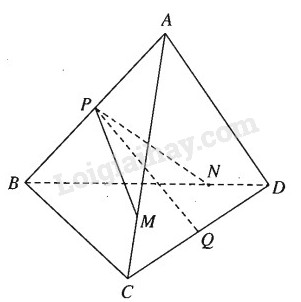Đề bài
Cho tứ diện ABCD. Gọi P và Q lần lượt là trung điểm của các cạnh AB và CD. Trên các cạnh AC và BD lần lượt ta lấy các điểm M, N sao cho
AMAC=BNBD=k(k>0)
Chứng minh rằng ba vectơ →PQ,→PM,→PN đồng phẳng.
Phương pháp giải - Xem chi tiết
Chứng minh →PQ=m→PM+n→PN và sử dụng điều kiện đồng phẳng của ba véc tơ và kết luận.
Lời giải chi tiết

Ta có:
→PQ=12(→PC+→PD)=12[(→AC−→AP)+(→BD−→BP)]=12[(→AC+→BD)−(→AP+→BP)⏟→0]=12.1k(→AM+→BN)
Vì →AC=1k.→AM và →BD=1k.→BN
Đồng thời →AM=→AP+→PM và →BN=→BP+→PN, nên →PQ=12k(→PM+→PN) vì →AP+→BP=→0
Vậy →PQ=12k→PM+12k→PN
Do đó ba vectơ →PQ,→PM,→PN đồng phẳng.

